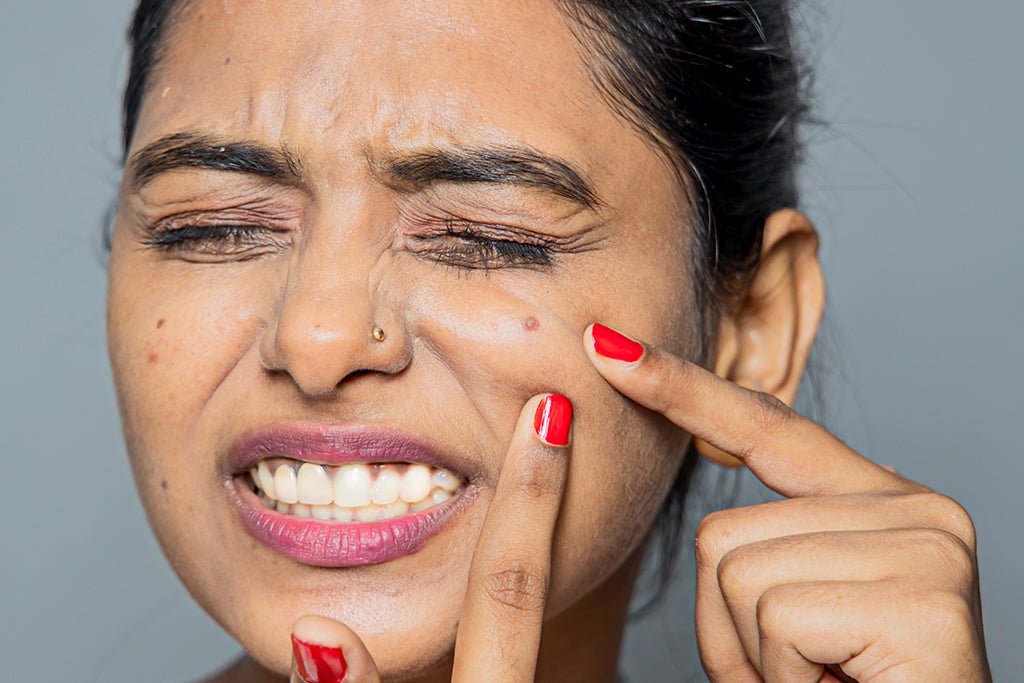One of the causes for acne is the excess sebum or natural oil by the skin that often leads to the clogging of skin pores. The overproduction of sebum is generally the reason that has led most to associate acne with oily skin.
But regardless of skin type, acne can affect everyone - even those with the dry skin type.
In This Article
Causes of Acne on Dry Skin
While excess sebum production is often the cause of acne, it isn’t the only one. The skin consists of hundreds of tiny pores that allow hair growth. These skin pores are known as hair follicles. When these hair follicles are clogged with sebum, dead skin cells, dirt, makeup residues and other impurities, the follicles become a breeding ground for bacteria. The accumulation of these impurities with bacteria in the skin pores lead to the development of acne.
For healthy skin, it is essential to keep the skin well-moisturised. But the dry skin type fails to produce sufficient amounts of sebum or natural oil necessary to keep the skin moisturised. In such a case, the skin barrier (top layer of the skin) is left with limited capabilities to protect your skin from harmful irritants. It also leads to irritation and inflammation of the skin which may further lead to dry skin acne.
Additionally, certain skin care products like a harsh face wash or other drying products may also be a reason for dry skin acne.
Treating Dry Skin Acne
The first and most essential rule while choosing skin care products for dry skin is to ensure that these products help moisturise and hydrate your skin. Avoid products that may be harsh and dry out your skin further. Now let’s take a look at a few necessary steps that you will need to follow religiously.
Face cleansers with active ingredients like glycerin, hyaluronic acid, niacinamide and oils like evening primrose, tea tree and shea butter are recommended. Opt for a soap and fragrance-free face cleanser.
Use a serum with active ingredients like niacinamide, retinol liposomes and azelaic acid.
Choose a face moisturizer that is oil-free and consists of ingredients such as niacinamide, ceramides, vitamin E and sodium hyaluronate.
When dealing with dry skin acne, it is recommended to stick with either acne skin care products that are also suitable for dry skin or continue with skin care products for dry skin type. For acne, use anti-acne treatments only on the problem areas.
Alternatively, You can opt for a face mask as a spot treatment for acne. When used as a spot treatment, SkinQ’s Acne Control Mask with the help of salicylic acid helps to unclog the skin pores while zinc PCA prevents an acne breakout. The SkinQ’s Acne Control Mask also consists of niacinamide as an active ingredient that helps restore skin moisture and acts as a lipid barrier. When used religiously 2-3 times a week, the mask helps protect your skin from free radicals and result in clear, smooth and radiant skin.
Home Remedies for Dry Skin Acne
In most cases, it is possible to minimise dry skin acne with home remedies. A few ingredients that can be used for treating acne are:
- Potato: Potatoes are rich in vitamin C and vitamin B. While vitamin C helps in promoting collagen production to repair acne scars, vitamin B helps in the regeneration of skin. Niacin in potatoes also helps to lighten the skin tone.
Alternatively, you can simply scrub a thin slice of tomato on your face. Avoid using excessive force while scrubbing.
A Few Things to Remember:
Apart from taking up treatments, you need to take special care of how you generally treat your skin.
- Washing your face with hot water may seem like a good idea, especially during winters, but it can lead to dryness of skin and damage the skin barrier. It is recommended to use lukewarm water instead to wash your face.
- Excessive touching of your face can transfer dirt and bacteria from your hands to your face causing acne breakouts. It is thus advised to avoid excessively touching your face.
- When towel-drying your face, avoid rubbing or scrubbing your face with the towel as it may cause irritation of the skin.
- Always patch test a skin care product before fully introducing it to your skin. In case you experience inflammation or irritation of the skin after using a skin care product, wash off the product. If the problem still persists, consult your dermatologist.
On An Endnote
Treating dry skin acne is possible when you know the cause and the right products and treatments of the acne. You do not need an extensive skin care regime, but a few simple steps with consistency is all you may need.
If the acne still seems persistent, it is recommended to consult your dermatologist.

